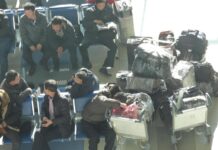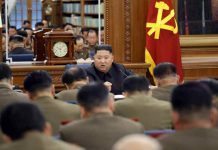As exchange rates in North Korea soar with the restart of China-North Korea freight train service after a two-year hiatus, a source says there are signs North Koreans with foreign currency are welcoming the development.
A source in Yanggang Province told Daily NK on Tuesday that some residents in Hyesan are welcoming the rising exchange rates because they can now buy five kilograms more of rice with RMB 100.
As recently as Jan. 11, the yuan was trading at KPW 600, while the dollar was trading in the KPW 4,000 – 5,000 range. Since around Jan. 20, however, rates have been soaring, with the yuan reaching KPW 850 and the dollar KPW 6,400.
Demand for foreign currency has been climbing due to the restart of China-North Korea freight train service last month and recent widespread talk of so-called “state-led smuggling” in the border regions of Yanggang Province.

While exchange rates have soared on the back of expectations of revived trade, food prices have fluctuated little, remaining around KPW 5,000 for a kilogram of rice.
Last month, RMB 100 could buy you 12 kilograms of rice, but now, you can buy 17 kilograms.
Likewise, RMB 100 could get you 1.76 kilograms of cooking oil last month, but now it gets you 2.56 kilograms. So, locals with foreign currency naturally welcome the climbing rates, according to the source.
On the other hand, many people are apparently trying to hold onto their foreign currency without spending it. This class of people has been paying for food using local currency, just as before.
The source said there is even speculation that the exchange rate will climb further based on rumors that trade will quickly return to normal. He added that more and more people are waiting, believing now is not the time to part with their foreign currency.
Please direct any comments or questions about this article to dailynkenglish@uni-media.net.



















